 MyCatBreeds
MyCatBreeds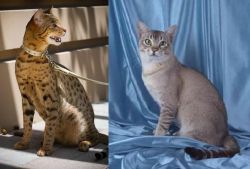 Both Ashera and American Keuda are originated from United States. Ashera may weigh 9 kg / 20 pounds more than American Keuda. Ashera may live 10 years more than American Keuda. Ashera may have less litter size than American Keuda. Ashera requires Moderate maintenance. But American Keuda requires Low maintenance
Both Ashera and American Keuda are originated from United States. Ashera may weigh 9 kg / 20 pounds more than American Keuda. Ashera may live 10 years more than American Keuda. Ashera may have less litter size than American Keuda. Ashera requires Moderate maintenance. But American Keuda requires Low maintenance
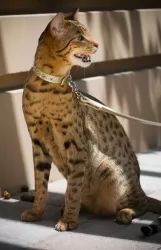 Hailing from the USA, and looking similar to the Savannah Cat, the Ashera is a hybrid breed of cat - an exotic domestic cat known as a designer cat that came about by crossbreeding the African Serval and the Asian Leopard cat.
Hailing from the USA, and looking similar to the Savannah Cat, the Ashera is a hybrid breed of cat - an exotic domestic cat known as a designer cat that came about by crossbreeding the African Serval and the Asian Leopard cat.
In fact, the cat was developed fairly recently through genetic manipulation and by the Lifestyle Pets laboratory. Also, some domestic cat was added to the mix as well, giving the cat a beautiful spotted coat similar to that of a leopard as well as some stripes.
Lifestyle Pets stopped producing these cats in 2008 so they’re hard to come by and are very expensive.
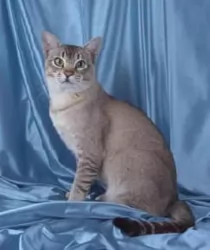 It is thought that the cat was brought to America by the Spanish to keep the rat population down.
It is thought that the cat was brought to America by the Spanish to keep the rat population down.
The name KEUDA stands for Kitten Evaluation Under Direct Assessment which is actually the name of a program that was running in Texas, Oklahoma and New Mexico and was for investigating the kinds of cats that survived as barn cats.
Today the Keuda isn’t registered and it’s not a well-known cat either, being looked upon as being similar to the Egyptian Mau breed as it shares some physical similarities with the Mau.
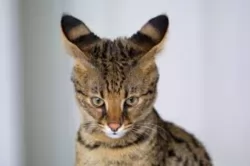 The Ashera cat has large ears with stripes and which are slightly rounded at the top. The eyes are a beautiful greenish-yellow shade.
The Ashera cat has large ears with stripes and which are slightly rounded at the top. The eyes are a beautiful greenish-yellow shade.
It's a large cat and can weigh as much as 14kg. The length of the body is long too and can be more than one meter in length. The cat is tall and if it stands up on its hind legs, it will be able to put its front paws on the shoulders of an adult.
People have always fancied owning such a large ‘domestic’ cat. There are different kinds of Ashera cats – the hypoallergenic one, the common Ashera, the snow Ashera, and the royal Aashera which looks much like the common Ashera but just a more rare type.
The Ashera is a very intelligent, independent cat and likes to climb, being a very playful cat, enjoying the company of children.
Because of its wild side, it's always on the lookout for prey. In spite of the cat’s size, it is an amicable cat and will even enjoy going on a walk with a leash. It’s not your traditional aloof cat and is both sociable and vocal and some people liken them to dogs.
Even though the cat enjoys the company of its human family, it doesn’t mind being left alone.
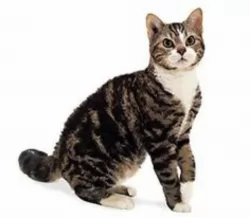 You can’t really pin-point what the American Keuda looks like as it looks a lot like the Maus but it can also look like a Siamese cat or even others.
You can’t really pin-point what the American Keuda looks like as it looks a lot like the Maus but it can also look like a Siamese cat or even others.
It is a medium-sized cat and can weigh up to 5 or 6kg while being very lithe and athletic. The head of the cat is medium-sized, the ears medium-large, the eyes almond-shaped, and the tail is slightly tapered.
An unusual aspect with this cat is its belly flap – loose skin that flaps at each elbow. The head is wedge-shaped, it has almond-shaped eyes, large ears and the fur is soft and silky and in a variety of patterns as well as solid colors. The coat is short to medium in length and there is no undercoat.
American Keudas are just your regular cat in personality - active, adaptable, inquisitive, and intelligent while being strong and agile.
They are also adaptable and social, getting along well with children as well as other pets in the home. It is also quite unusual in that it likes playing with water. They are also playful and love running, jumping and climbing and indoors it will want a climbing cat tree.
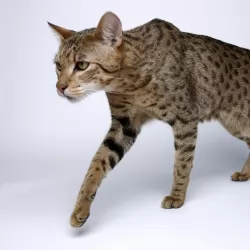 The Ashera cat is beautiful alright but you might battle to get hold of one and they cost a fortune too, being the rare breed it is.
The Ashera cat is beautiful alright but you might battle to get hold of one and they cost a fortune too, being the rare breed it is.
Hybrid cats mean that the breeding of cat species that would never have mated in the first place.
Wild cat breeds belong in the wild. They’re solitary by nature and if they battle to adjust to being in a social setting they land up in a shelter, abandoned as ‘bad news’. People aren’t clever tampering with nature particularly when it’s just to feed the ego of humans who want something unusual and exotic that nobody else has.
There are pet owners who are willing to spend enormous sums of money to own a rare cat such as the Ashera.
If you want an Ashera, there are just a few kittens being made available each year. One thing is sure, they make splendid pets, being playful, loyal, intelligent, and affectionate.
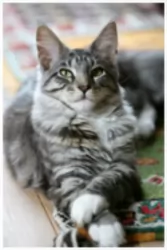 The beauty of American Keuda cats is that they are no-fuss cats and they are energetic, amicable, social, and playful and they make wonderful companions.
The beauty of American Keuda cats is that they are no-fuss cats and they are energetic, amicable, social, and playful and they make wonderful companions.
They are also fond of water and can even strike up a friendship with your dog. By bringing a Keuda into your home you can rely on a steady, loving friendship with your feline friend.
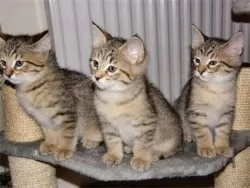 The scientists involved with the development of this cat tell us that it can reach up to 25 years of age.
The scientists involved with the development of this cat tell us that it can reach up to 25 years of age.
It’s a new cat breed and at this time there are no common diseases that affect this beautiful feline.
Remember that these cats come with an insurance policy and this means that the cat’s veterinary visits will be covered for the entire first year of its life. Your Ashera cat will also be vaccinated and chipped and the cat will have been spayed or neutered before he comes to you.
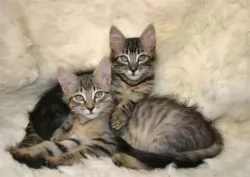 Thes cats enjoy good health and live to be 15 years of age or older even. You just have to watch out for him as they have no undercoats and it’s not a cat to do well in the cold.
Thes cats enjoy good health and live to be 15 years of age or older even. You just have to watch out for him as they have no undercoats and it’s not a cat to do well in the cold.
Whenever you buy a cat for the first time, try and find out about vaccines and previous conditions that might require special treatment.
Healthy kittens and cats are always alert and energetic with shiny coats and clear eyes.
Dental disease is quite common in cats, and it is always a good idea to have your pet’s teeth checked by your vet. Signs of pain with dental problems can include lethargy, pawing at the mouth, facial swelling, and reduced appetite. Get your cat immediately to the vet if you suspect problems with his teeth.
Neutering and spaying are imperative if you don’t want your pet to have kittens. It’s a simple operation for your pet and it comes with many health benefits for your cat. You don’t want your female cat having kittens as there are just already so many stray cats in shelters. Spaying and neutering mellows a cat too, makes them less prone to wandering, spraying, and fighting.
Make sure you have your American Keuda vaccinated against the many cat diseases that there are. Vaccinations are available against feline infectious enteritis or feline parvovirus, cat flu and feline leukemia virus, a disease that damages the cat’s immune system. Kittens require their first vaccine at around 8 weeks of age.
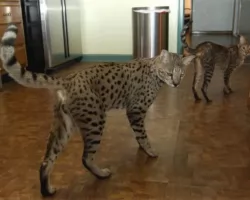 The Ashera doesn’t need any special food as they will eat the same cat food that your other cats eat. If you feed your cat commercially manufactured food, make sure its food that is of a high quality.
The Ashera doesn’t need any special food as they will eat the same cat food that your other cats eat. If you feed your cat commercially manufactured food, make sure its food that is of a high quality.
Those who have owned an Ashera cat, say tthat looking after an Ashera is much the same as lookijg after your regular domestic cat,
These cats like warmth so make sure you provide him with a warm blanket in his sleeping area.
You won’t have to worry about spaying or neutering your Ashera cat, as they are sterile. The ony place you can buy this cat is from the Lifestyle Pets laboratory. The laboratory implants a chip into the cat and they also undertake to vaccinate the cat for a year.
It’s a low maintenance cat and you can brush the short coat from time to time. Ensuring a good diet will bring about a lustrous, healthy coat.
The cat is intelligent so it will require toys that get him thinking and working things out. Also supply the Ashera with a scratching post.
They Ashera will need the best kind of cat food there is and you will want to ensure he has a good intake of protein and fats to maintain his gorgeous coat and his muscles.
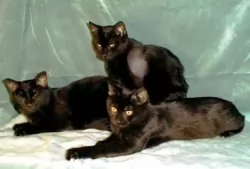 Every cat needs to be fed a complete, balanced high-in-protein food. There are heaps of different brands of cat food on the market - wet and dry. Always follow the manufacturer’s instructions and recommended amounts. If in any doubt about what to feed your cat, speak to your vet. Every cat needs a constant supply of fresh, cool water.
Every cat needs to be fed a complete, balanced high-in-protein food. There are heaps of different brands of cat food on the market - wet and dry. Always follow the manufacturer’s instructions and recommended amounts. If in any doubt about what to feed your cat, speak to your vet. Every cat needs a constant supply of fresh, cool water.
Both young and older cats love to play so ensure you provide your cat with stimulating toys as well as things such as climbing trees and a scratching post. Cats enjoy a high-up place where they can feel safe and view their surroundings from a height.
Cats spend many hours a day sleeping and you need to provide your cat with a warm, dry, comfortable, quiet place to rest. There are many cat beds available, but if you don’t have one, a cardboard box with one side removed and a soft cushion or blanket will do.
Invest in a litter box for your cat to do his business in and keep it in a safe, quiet place where your cat can ‘toilet’ in peace and quiet. These should be placed away from the food and water bowls. Make sure to keep a small plastic rake close by and rake up the cat droppings regularly to ensure the litter tray is nice and clean.
Your American Keuda is a short-haired cat but you want to brush the fur gently at least once a week. Grooming also provides you and your cat with some valuable bonding time.
Provide your cat with a collar to show everyone that he is yours. Also, have your cat microchipped – a tiny chip that carries your pet’s unique ID number and which is inserted safely and gently under the cat's skin.
Have your cat treated and free from parasites such as ticks, fleas, and worms. Speak to your vet about this.